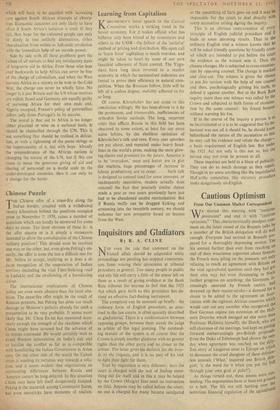Chinese Puzzle
rritae Chinese offer of a cease-fire along the I Indian border, coupled with a withdrawal twenty kilometres behind the positions occupied prior to November 7, 1959, raises a number of questions which can hardly be answered for some a:lays to come. The most obvious of these is: is the offer sincere or is it simply a manoeuvre intended to allow the consolidation of the Chinese • military position? This should soon be resolved one way or the other, but, even given Peking's sin- cerity, the offer is none the less a difficult one for Mr. Nehru to accept, implying as it does a de facto recognition of the amputation of Indian territory (including the vital Tibet-Sinkiang road in Ladakh) and the swallowing of a humiliating diktat.
The international implications of Chinese policy are even more obscure than the local situ- ation. The cease-fire offer might be the result of Russian pressure, but Peking has done too much damage to Moscow's policies already for such a presumption to be very probable. It seems more likely that Mr. Chou En-lai has measured accu- rately enough the strength of the reactions which China might have aroused had the advance of its troops continued. He would certainly wish to avoid Western intervention on India's side and to localise the conflict as far as is compatible with humiliating the Indian Government in Asian eyes. On the other side of the world the Cuban crisis is winding its tortuous way towards a solu- tion, and it seems evident that negotiations on outstanding differences between Russia and America cannot be long delayed. In this situation China may have felt itself dangerously isolated. Peking is the maverick among Communist States, but even mavericks have moments of realism.










































































 Previous page
Previous page